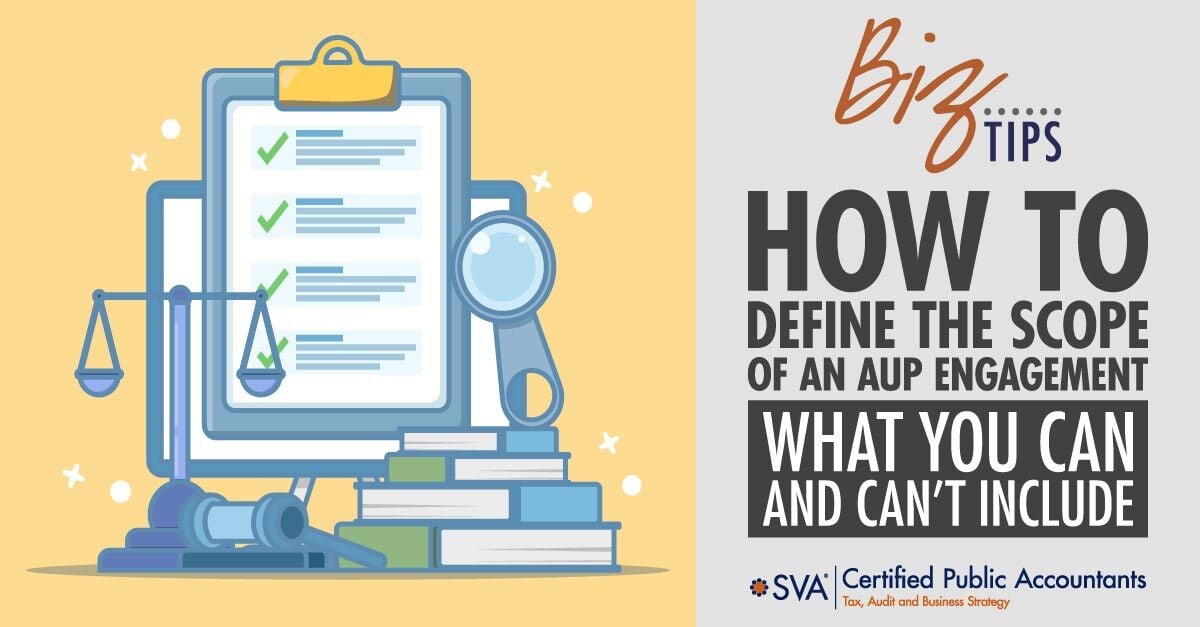| Highlights: |
- Defines what an Agreed-Upon Procedures (AUP) engagement is and emphasizes that the client and CPA must agree in advance on specific, objective procedures without opinion or interpretation.
- Lists examples of procedures that can be included (e.g., testing financial records, compliance checks, transaction reviews) and stresses that these must produce factual, measurable results.
- Clarifies what can’t be included in the scope—such as judgment-based work, vague language, or interpretations—along with tips for drafting a clear, effective AUP scope.
|
An Agreed-Upon Procedures (AUP) engagement can be a valuable tool when businesses need targeted financial or compliance procedures completed, without the cost or commitment of a full audit.
But before any testing begins, the most important step in the AUP process must happen first: defining the scope.
To get the most out of an AUP engagement, a business owner or financial decision-maker must understand what can and can’t be included in the scope of the AUP. This will help them get the most out of the engagement.
What Is an AUP Engagement?
An AUP engagement is a service performed by a CPA firm in which they carry out specific procedures agreed upon in advance between the CPA and the client (you). The CPA doesn’t offer opinions or conclusions; they simply report the factual results of the procedures performed.
AUP engagements are highly customizable and usually more efficient than a full audit. A common use for an AUP is when stakeholders (like lenders, partners, or regulators) need confidence that certain processes, numbers, or controls have been examined, but don’t need a formal opinion.
(Download Video Transcript)
Key Principles for Defining Scope
Clarity and precision are very important when defining the scope of an AUP engagement. Here are some key principles to remember when defining the scope of an AUP:
| You Have Control of the Scope |
You and your CPA agree on exactly what procedures will be performed. |
| Procedures Must Be Objective |
They must produce factual results that do not require the CPA to interpret or evaluate. |
| Nothing Beyond the Agreed Scope Will Be Included |
The CPA can’t add or change procedures during the engagement. |
What Can Be Included in an AUP Scope
Businesses determine the scope of the AUP based on their needs. The scope can be broad or narrow, but it must always be specific and measurable. Here are examples of procedures that can be included:
| Financial Records Testing |
Verify a sample of invoices against supporting documentation. |
| Recalculate sales tax on a sample of sales transactions. |
| Compliance Checks |
Confirm that vendor contracts meet terms (e.g., delivery dates, payment timing). |
| Verify that employee expense reports comply with company policy. |
| Internal Controls Testing |
Check that dual signatures are present on disbursements over $10,000. |
| Confirm system access removal for terminated employees within 5 days. |
| Transaction-Specific Reviews |
Review all wire transfers over $50,000 for approval documentation during Q2. |
| Test 15 lease agreements for compliance with ASC 842. |
The procedures should always result in a yes/no, pass/fail, or numerical outcome. For example, “Did the invoice match the purchase order?” is valid. “Was the expense reasonable?” is not.
What You Can't Include in an AUP Scope
While AUP engagements offer flexibility, there are clear limitations on what can be included:
| Judgement-Based Procedures |
Anything requiring a CPA to interpret reasonableness or adequacy. |
| For example: “Assess the effectiveness of internal controls” is too subjective. |
| Broad or Vague Language |
Don’t use unclear procedures like “review financial records for accuracy.” Clearly define what’s being reviewed and how. |
|
| Opinions or Conclusions |
A CPA cannot state whether controls are sufficient, if fraud is present, or whether your financial health is strong. Their job is to only report what they observed during testing. |
|
If you are looking for an opinion, you may need an audit or review instead of an AUP.
Tips for Scoping a Clear and Effective AUP
Businesses can save time, reduce costs, and get more actionable results by getting the scope right up front. Here are some tips:
| Collaborate Early |
Work closely with your CPA to draft procedures that meet your needs and comply with AUP standards. |
| Be Specific |
Clearly define time periods, transaction thresholds, and sample sizes whenever possible. |
| Focus on Risk Areas |
Use the AUP to dig into known concerns or areas needing third-party validation. |
| Don't Wait to Finalize |
Define everything at the start of the engagement, as scope changes after the fact aren’t allowed. |
Benefits of a Well-Defined Scope
A clear and effective scope leads to:
- A more efficient engagement that avoids unnecessary work.
- Straightforward results that you can share with stakeholders.
- A cost-effective alternative to audits or formal reviews.
- A better understanding of specific risks or concerns within your business.
Define with Purpose
The flexibility of an AUP engagement makes it a great tool for businesses, but its value depends entirely on how well the scope is defined.
Specific and objective procedures will provide businesses with answers to questions they have regarding the business and help support decisions that must be made.
© 2025 SVA Certified Public Accountants

